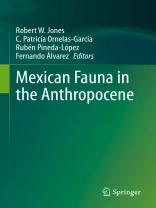This contributed volume presents an analysis of the current conservation status of major faunal groups in Mexico. The chapters describe a prognosis of future challenges, and also explore the expanding threats inherent in the Anthropocene within the context of the unique physical, biological and cultural aspects of the nation. Covering 27 chapters, and written by Mexican and international authors, this book analyzes a wide range of vertebrate and invertebrate animal taxa, their ecosystems and the critical processes related to their present conservation status. This volume is an important reference material for researchers, conservationists and students interested in the biological and ecological processes shaping the Mexican fauna.
Spis treści
1.1 General Introduction Principal.- 2. Zoloogical Groups.- 2.1 Arachnids.- 2.2 Insects: Migrants, endemics, and old to new pests.- 2.3 Freshwater decapod crustaceans: the challenges of documenting and preserving a very diverse fauna.- 2.4 Mexican molluscs: In the process of a 'silent extinction’.- 2.5 Amphibians and reptiles.- 2.6 Anthropocene impacts on the Mexican freshwater fish fauna.- 2.7 Mexican avifaunas of the Anthropocene.- 2.8 Marine birds.- 2.9 Terrestrial mammals.- 2.10 Marine mammals.- 2.11Mexican bats: conservation challenges in the Anthropocene.- 3. Ecosytems.- 3.1 The impact of the growth of urban environments on Mexican fauna.- 3.2 Anchialine fauna of the Yucatan Peninsula.- 3.3 Semi-terrestrial and aquatic invertebrates and fish in mangroves in México.- 3.4 Defaunation of Mexican tropical forests3.5 Mezcal boom and extinction debts in Mexican arid ecosystems.- 3.6 Deep sea life.- 3.7 The importance of agroecosystems for the Mexican fauna.- 3.8 The salamanders of the Mexican cloud forest.- 3.9 Human effects on caves in Mexico.- 3.10 Fauna of lakes and rivers.- 3.11 Coral reef faunal assemblages in the Mexican Caribbean: assessing the cryptic biodiversity.- 4 Processes.- 4.1 Contemporary climate change impacts on Mexican fauna.- 4.2 Invasive alien species of invertebrates and fishes introduced to Mexican freshwater systems.- 4.3 Are marine fisheries sustainable?.- 4.4 Pest dynamics in Mexican forests.- 4.5 Pollination by wild and managed animal vectors.- 4.6 Social participation strategies for the conservation of Mexican fauna.- 4.7 Citizen science for deep ocean biodiversity: a crowdsourcing tool in support of conservation.- 4.8 Legal actions for the conservation of fauna.
O autorze
Dr. Fernando Alvarez is an aquatic invertebrate biologist with a special interest in crustaceans. He obtained a B.Sc. degree from Facultad de Ciencias, UNAM; a Master’s from Tulane University, New Orleans, Louisiana; and a Ph D from the University of Maryland, College Park, Maryland in the USA. He is a full Professor and Curator of the National Crustacean Collection at Instituto de Biología, UNAM. He has been Editor in Chief of Revista Mexicana de Biodiversidad since 2011 and has been recognized with the level 3 at the National Researchers System of CONACYT, Mexico. He has authored 186 scientific publications, including 133 journal articles, 35 book chapters, 10 books and 8 contributions for the general public.
Dr. Robert W. Jones is an entomologist with interest in systematics, tropical ecology and subsistence agriculture. He graduated with a B.Sc. from the University of Massachusetts and a Master’s and Ph D from Texas A&M University. He has conducted research in Honduras and worked in various regions of Mexico. For the past 24 years has been a professor, researcher and zoology collection curator at the Autonomous University of Querétaro in central Mexico. Since 1996, he has been a member of the National Researchers System of CONACYT, Mexico, presently at level 2. He has over 65 journal articles, 21 book chapters and several publications for the general public.
Dr. Patricia Ornelas García is an ichthyologist whose research is focused on the evolutionary biology of freshwater fishes. She obtained a B.Sc. degree from Facultad de Ciencias Naturales, at Universidad Autónoma de Querétaro, and her Ph.D. from the Universidad Complutense de Madrid, Spain. She is a Full Professor at Instituto de Biología, UNAM. She has authored 38 scientific publications, including 23 journal articles, 6 book chapters, 3 books, and 6 contributions for the general public. She has been recognized with level 1 at the National Researchers System of CONACYT, México.
Dr. Rubén Pineda-López is a Biologist and Master of Science from Universidad Nacional Autónoma de México, and Ph. D. from Universidad de Alicante, Spain. He is a full-time professor at the Universidad Autónoma de Querétaro. Currently it is focused on the study of the patterns of bird diversity, especially how birds are affected in aquatic and urban environments. Author of 28 scientific articles, six books and eight book chapters. He has been recognized with level 1 at the National Researchers System of CONACYT, México.












